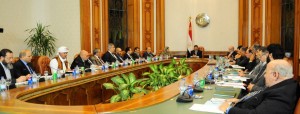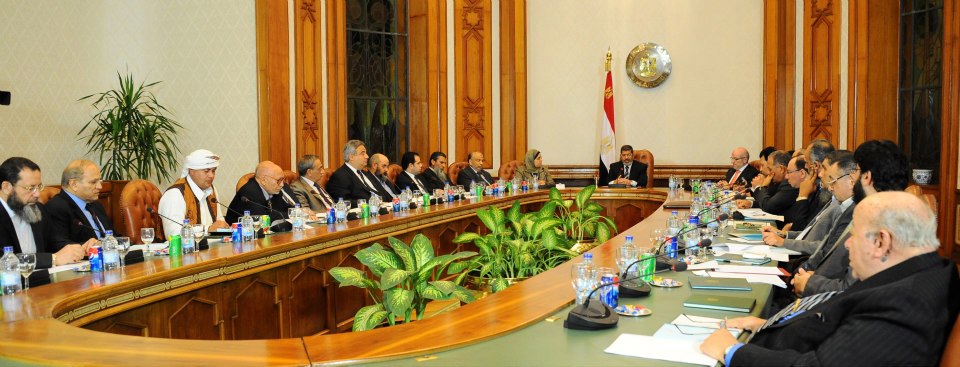
(Photo Presidency hand out)
President Mohamed Morsi met with 13 political parties and a number of public figures on Tuesday evening to hear their suggestions on how to assure a transparent electoral process.
In a four-hour meeting held at Itihadiya presidential palace, Morsi started the meeting with a wrap-up of the political milestones reached over the past year. He repeatedly stressed the importance of continuing to build state institutions and forming a new parliament. As he spoke about the presidential elections, the public referendum on the constitution, and the Shura Council elections, the President described all previous voting processes as “objective and of a high level of neutrality.”
The session was moderated by his presidential aide Pakinam Al-Sharkawy and advisor Ayman Aly, who allowed five minutes for each participant to give his suggestion, stating that the microphone would shut off automatically after the allocated period.
The participants came up with five recommendations to ensure the integrity and transparency of the upcoming Parliamentary elections. Last week, Morsi announced that the Parliamentary elections are scheduled to take place in four stages, beginning on 22 April.
The first recommendation of the national dialogue session is to formulate a committee bringing together representatives of all participating political parties to connect with the Supreme Electoral Commission (SEC) during the election period.
Abul Ela Mady, the head of the Islamist Al-Wasat Party, suggested this idea during the meeting and said it will help transmit the concerns of competing political parties to the SEC.
The participants also agreed that the SEC would require certain institutions to set the criteria before forming the team which will assist the judiciary authority supervising the elections. Mady elaborated that the names of employees, belonging to different ministries and organisations and assigned to help out at polling stations, should be known ahead of the elections.
“Maybe some names had problems in helping out in previous elections and there were appeals submitted against them,” he said.
A mechanism to count and report electoral violations was also proposed. Violating the electoral silence period, exceeding the financial ceiling for electoral campaigning, and using houses of worship for campaigning should be reported according to specific procedures. There should also be a code of media ethics to prevent media bias against participating political parties. In the interests of preventing media bias, the participants highlighted the importance of establishing strong contacts with the Supreme Council of Journalism.
Saad Al-Katatny, head of the Muslim Brotherhood’s Freedom and Justice Party, criticised media channels that launched fierce attacks on political parties and figures. He affirmed the need to set a code of media ethics as one of the guarantees of integrity in the elections.
He also said that the participation of all voters in the elections is one of the fundamental requirements for a free electoral process. “We cannot imagine that the coming elections will be forged. Why did the 25 January revolution erupt in the first place? Because the 2010 parliamentary elections were forged,” he added.
Commenting on electoral violations, Al-Katatny called for “criminalising those who violate the rules in the elections law.” He said a political party or figure that breaks the electoral regulations should be banned from political participation.
The meeting also suggested enhancing the role of the SEC’s media committee to ensure its efficiency when receiving complaints from voters.
The final recommendation advocated the importance of facilitating election monitoring by local and international civil society organisations. Morsi said that 50 civil society organisations have applied to monitor the elections; five of these are foreign, including the United Nations, the European Union and the Carter Centre.
Dialogue participants agreed to make contact with groups boycotting the dialogue and the elections. This will be done through a secondary committee who will establish contact with boycotting groups and convince them to participate in the elections.
External suggestions from absent political groups will be accepted until 28 February, before the final list of recommendations is sent to the SEC.
“We are still concerned about participation of the absent political groups; we repeat our invitations to them and we wish for their attendance,” said Morsi.
The National Salvation Front, Egypt’s largest opposition bloc, the Strong Egypt Party, Kefaya, April 6 youth movement and a handful of political figures have turned down Morsi’s invitation for dialogue.
The presidency has hosted eight dialogue sessions since on 8 December 2012. Morsi described all of them as “successful”, stating that they have helped Egypt move forward.

